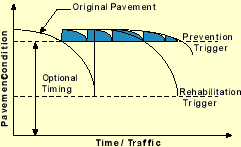Construction and Maintenance Fact Sheets
North Carolina Uses Cash Flow Financing for Pavement Preservation
October 2001 FHWA-IF-02-008
Thanks to a recent action by the State's General Assembly, the North Carolina Department of Transportation (DOT) will have at its disposal millions more dollars for highway maintenance. The provision, passed in September 2001, authorizes the DOT's use of $470 million in State Highway Trust Fund cash balances to restore primary routes that range from fair or poor condition to good condition.
Though 11th in the Nation in population, North Carolina has the second largest State-maintained road system at 78,000 miles, 14,616 of which are primary highways carrying 60 percent of vehicle miles traveled in the State. Forty-one percent of the State's road system is currently rated at "fair" or "poor." Addressing the urgency of fixing the most heavily-used roads, a special provision of the State budget bill (SB1005) directs a portion of the Highway Trust Fund's cash balance to be spent on pavement preservation efforts, which include the strengthening, shoulder widening, and resurfacing of the State's primary (non-Interstate) highway system. This process of cash flow financing, also known as cash management, will enable the allocation of $150 million to $170 million each year for 3 years to North Carolina's 14 highway divisions for needed road work.
How Cash Flow Financing Works for North Carolina DOT
At the end of the 1999-2000 fiscal year, the Highway Trust Fund had reserves of $858 million and the Highway Fund had a cash fund of $270 million. The Joint Legislative Oversight Committee, seeking to divert some of that money into projects that could immediately help fulfill the State's highway maintenance needs, contracted a private study to examine the plan's feasibility. Dye Management Group of Bellevue, Washington, recommended that North Carolina could use that cash balance for road repair projects if the General Assembly passed legislation freeing up the funds. Dye's David Rose says that this approach is not unique; an increasing number of States are doing business this way. He adds that, although there are cases in which cash management is a good idea, States have to be careful; they must implement sound financial management and planning or else run the risk of depleting highway funds.
Section 1 of the North Carolina legislation directs the DOT to use "cash flow financing to the maximum extent possible to fund highway construction projects" and addresses the inherent risks by mandating the following controls:
- establishing a financial planning committee
- developing a monthly financial report
- establishing appropriate fund cash level targets
- reviewing revenue forecasting procedures
- reducing accrued unbilled costs
- reorganizing preconstruction functions to expedite project delivery and maximize use of cash flow financing of projects
- designating a specific person to be responsible for project delivery, writing project delivery reports, assessing which projects can be accelerated using cash flow financing, and reporting quarterly for 2 years to the Joint Legislative Transportation Oversight Committee.
Sections 2 and 3 of the law empower the State Treasurer to combine the balances of the Highway Trust Fund and the Highway Fund and to make short-term loans between the Funds to facilitate cash flow financing.
|
Applying pavement treatments at the optimal time provides the most efficient use of funds to extend the life of the pavement. "Addressing the urgency of fixing the most heavily-used roads, a special provision of the State budget bill (SB1005) directs a portion of the Highway Trust Fund's cash balance to be spent on pavement preservation efforts..." |
Additional Funding
And finally, in addition to the $470 million to be used for primary route pavement preservation, the remainder of the legislation specifies two other smaller provisions: $15 million per year for 3 years is to be used for preliminary engineering, the idea being that if the planning and design of projects occurs sooner, money can be saved over the long run in maintenance costs. And another $15 million per year for 3 years is designated for installing electronic signal and traffic management systems that will improve the operational efficiency of the State's road system by reducing delays and facilitating traffic flow.
The new provision also stipulates that the DOT must ensure that improvements made using cash balance funds will not interfere with the delivery of Highway Trust Fund projects on the 2002-2008 Transportation Improvement Program schedule. While being mindful of that caveat, highway officials in the State are now free to draw from an unused pool of cash to make needed repairs to North Carolina's primary roads, thus increasing safety and mobility for their customers. Quick to allocate the new funds, the DOT reports that more than $80 million will be let to contractors by the end of October 2001. For more information, contact:
Len Sanderson, State Highway Administrator, North Carolina Department of Transportation
Phone: 919-733-7384
Email: lsanderson@dot.state.nc.us.
To learn more about pavement preservation, contact your local FHWA division office or Steve Mueller, System Preservation Engineer, at telephone: 202-366-1557; fax: 202-366-9981; email: steve.mueller@fhwa.dot.gov.


